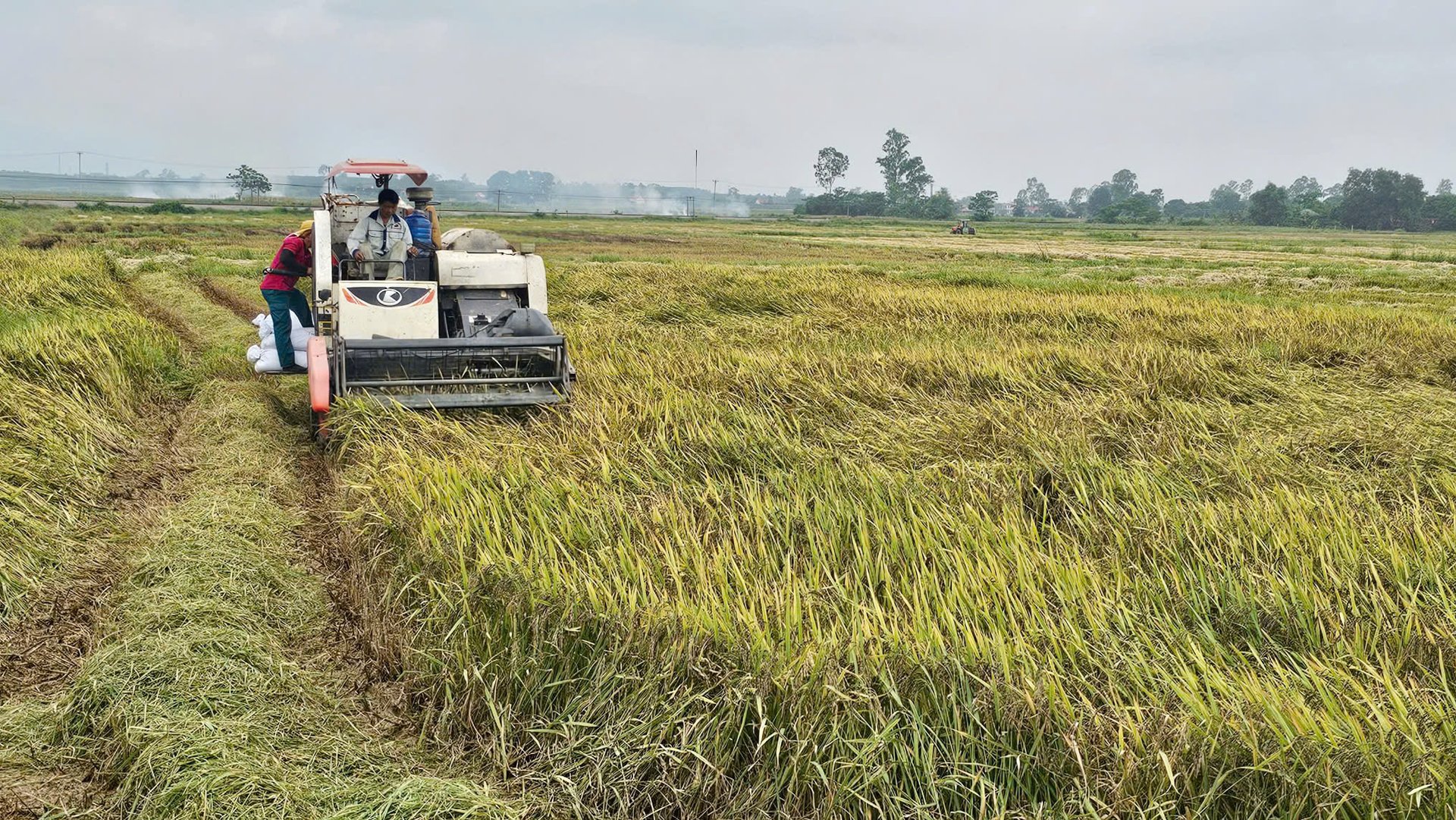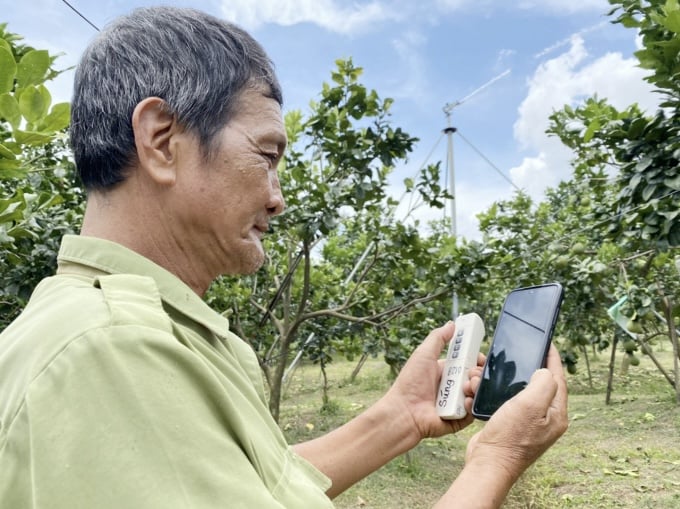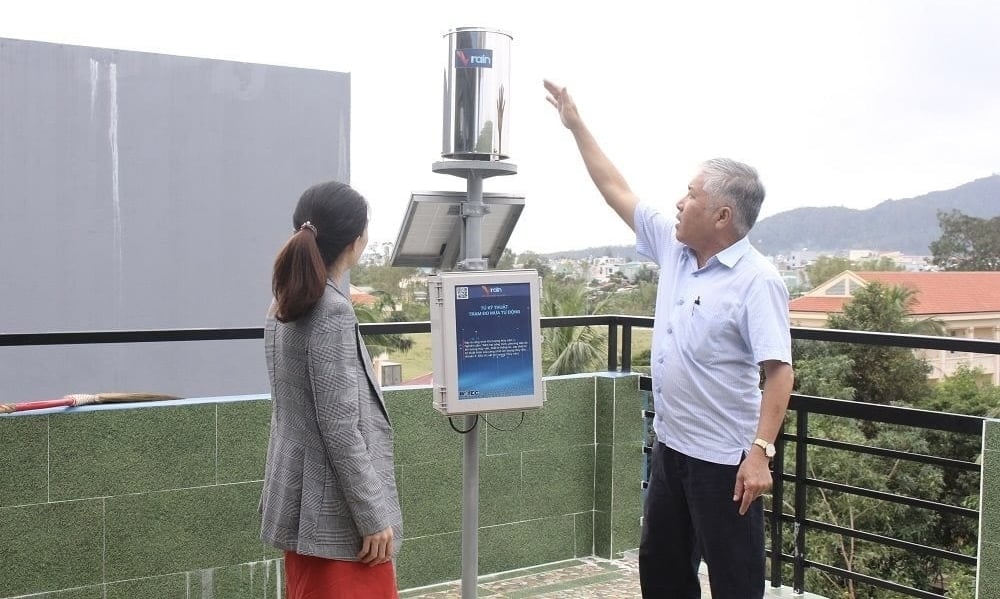November 8, 2025 | 06:41 GMT +7
November 8, 2025 | 06:41 GMT +7
Hotline: 0913.378.918
November 8, 2025 | 06:41 GMT +7
Hotline: 0913.378.918

Hydrometeorological applications help farmers adjust their cropping schedules more appropriately, thereby improving production efficiency and adapting to climate change. Photo: T. Phung.
Japan’s Sorimachi Group is one of the strategic partners of Vietnam Ministry of Agriculture and Environment thanks to its digital solutions that help farmers manage cultivation effectively.
Within the framework of the One Million Hectares of High-Quality, Low-Emission Rice Project, Sorimachi Vietnam Co., Ltd. has developed several practical technological solutions, notably FaceFarm – a tool that supports crop planning based on meteorological data, records cultivation logs, and monitors resource usage. The software also provides seasonal risk assessments and traceability, meeting VietGAP and GlobalGAP standards.
However, Sorimachi Vietnam faces several challenges in collecting hydro-meteorological data and production data from farmers. According to Mr. Nguyen Thanh Mong, Market Development Director of Sorimachi Vietnam, domestic hydrometeorological data remain fragmented, unsynchronized, and updated irregularly, making it difficult to analyze accurately and produce realistic forecasts.
Additionally, the lack of detailed regional data, particularly regarding pesticide use and planting area codes, diminishes the effectiveness of crop season management. Farmers are either unfamiliar with or lack the tools to keep accurate records, resulting in incomplete and inaccurate data collection.
“Network infrastructure and technological devices in many rural areas remain limited, significantly affecting the ability to update data in real time. At the same time, data security and sharing remain obstacles due to the lack of legal frameworks and appropriate technical solutions,” Mr. Mong shared.

Through smart applications on their phones, farmers can plan their planting schedules and keep accurate cultivation logs. Photo: Le Hoang Vu.
To collect and share hydrometeorological data effectively, Mr. Mong emphasized the need to invest in data infrastructure through automated, continuously updated, and highly accurate measurement systems. Additionally, observation stations should be strategically distributed regionally to ensure comprehensive data coverage.
Therefore, Mr. Mong proposed that relevant authorities should open shared data portals to unify the data platform, creating favorable conditions for both businesses and farmers to access information more easily. Policymakers should also establish a clear legal framework, including policies that support access to public data and mechanisms for public-private data sharing, to ensure data safety and security.
"Currently, household-level data need to be integrated into national-level systems to form a comprehensive foundation. This will serve as the basis for developing suitable tools and training programs for farmers. Enterprises, government agencies, and international organizations should collaborate to promote the application of AI and Big Data in hydrometeorological data management.
Sorimachi Vietnam looks forward to close cooperation with specialized agencies and farmers to improve data quality, thereby enhancing the effectiveness of development solutions," Mr. Mong shared.
Mr. Van Phu Chinh, Chairman of the Board of Directors of Water Resources Development and Consulting Company (WATEC), stated that currently in Vietnam, there is still no weather application that fully meets the requirements for weather forecasting and warning for the socio-economic activities of people and communities.
“No matter how advanced meteorological forecasting technology may be, the core factor to ensure accuracy remains real-time monitoring data. These data are collected through meteorological monitoring stations and weather radars. Especially in agriculture, effective forecasting also requires additional data such as soil moisture, pH levels, flooding depth, pests, and diseases," Mr. Chinh said.

With a simple, compact design suitable for Vietnam’s terrain and weather, the Vrain automatic rain gauge system occupies little space and can be installed anywhere. Photo: Pham Yen.
WATEC stands out with its specialized Vrain automatic rain gauge system, which has currently deployed 2,650 stations nationwide, enhancing the capacity for disaster forecasting and response. The company is also a pioneer in providing hydrometeorological monitoring data as a service to support localities and reservoir operators of irrigation and hydropower dams in disaster prevention and safe reservoir operation.
According to Mr. Chinh, the biggest challenge currently is ensuring the stable, continuous, and accurate operation of the installed monitoring systems. As electronic devices, automatic monitoring stations require regular inspection, maintenance, and calibration according to technical regulations for automatic monitoring. This demands an annual budget for operation and maintenance. However, due to funding mechanism obstacles, many localities and units have not been able to allocate resources in a timely manner to support these activities.
With a spirit of serving the community, despite the above difficulties, WATEC continues to ensure the uninterrupted operation of automatic monitoring stations, including lifetime warranty costs for stations serving the command, direction, and disaster response management at all administrative levels and localities. "Local authorities should pay attention and facilitate conditions so that the company can maintain and operate existing stations effectively, while continuing to develop new monitoring systems to avoid wasting the investment resources already committed", Mr. Chinh shared.
WATEC Company has successfully exported its "Smart flood warning tower" product to the Philippines. This is a disaster warning system that uses IoT technology and cloud computing to monitor and provide real-time flood alerts in urban and delta areas.
The Smart flood warning tower has been deployed in 16 provinces and cities across Vietnam and received the Second Prize at the Vietnam Science and Technology Innovation Awards 2024, the Smart City Award 2024, and was listed among the Top 10 outstanding digital technology products "Make in Vietnam 2024" in the fields of agriculture, natural resources, and environment.
According to Mr. Chinh, this invention can be effectively applied in agriculture, especially in cultivation areas frequently affected by floods, heavy rains, or extreme weather conditions.
Translated by Phuong Linh

(VAN) Sustainable coconut cultivation is the key to achieving balance among three pillars: economic efficiency, ecological safety, and consumer trust.

(VAN) A wood pellet factory has been supporting forest growers certified under FSC standards to improve their income and promote sustainable forest protection.

(VAN) Associate Professor Dr. Pham Anh Tuan emphasized that clearly identifying target groups, production scale, and consumer markets is key to ensuring the sustainable development of Viet Nam’s coconut industry.

(VAN) More than 400 experts from domestic and international organizations attended the ACT Con 2025 conference, which aimed to connect technology developers with frontline conservation teams.

(VAN) Food irradiation technology is an innovative solution that extends shelf life and acts as a ‘golden visa’ enabling Vietnamese agricultural products to access the world’s most demanding markets.

(VAN) At Dinh My commune (An Giang province), Loc Troi Group recently organized Mini Expo 2025 under the theme ‘From technology to practice – Comprehensive cultivation solutions for crops.’
/2025/11/04/2510-4-162016_246.jpg)
(VAN) The launch of the 'Carbon for Good' project in Lai Chau opens up a new direction in forest management and protection, laying the foundation for developing carbon credits.